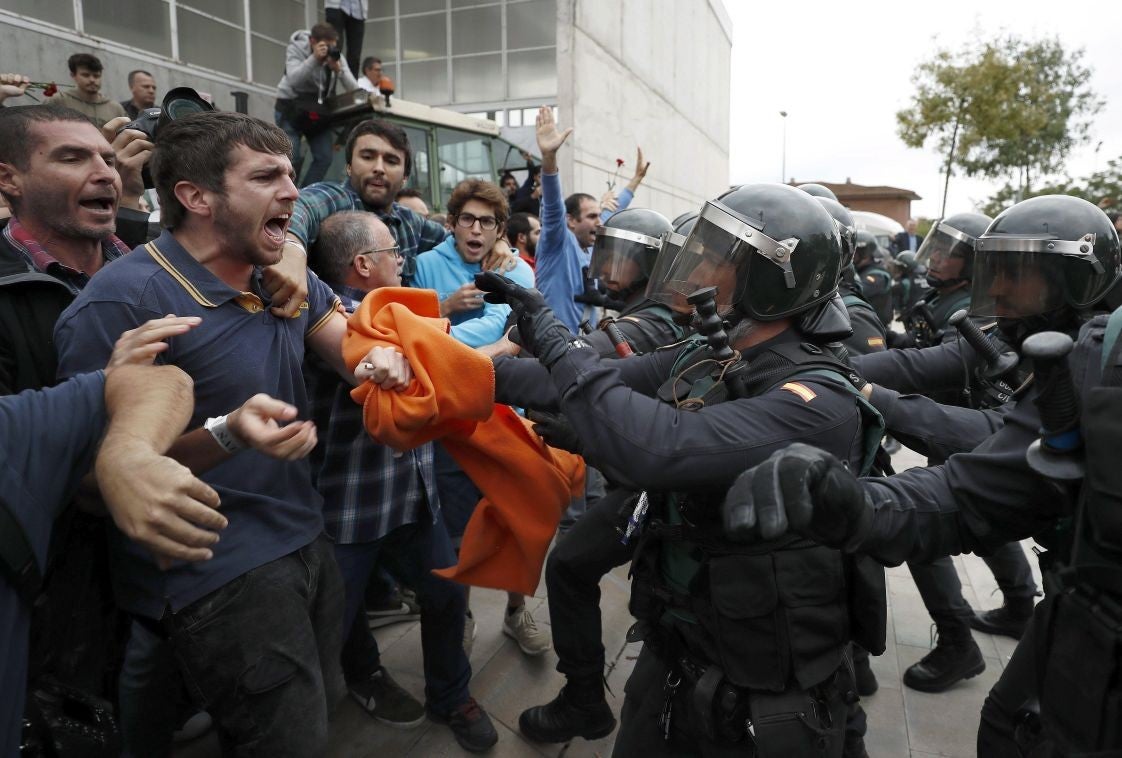Catalan independence referendum illegal under Spanish constitution, European Commission confirms
'This is an internal matter for Spain,' says EU's executive following calls to intervene
Your support helps us to tell the story
From reproductive rights to climate change to Big Tech, The Independent is on the ground when the story is developing. Whether it's investigating the financials of Elon Musk's pro-Trump PAC or producing our latest documentary, 'The A Word', which shines a light on the American women fighting for reproductive rights, we know how important it is to parse out the facts from the messaging.
At such a critical moment in US history, we need reporters on the ground. Your donation allows us to keep sending journalists to speak to both sides of the story.
The Independent is trusted by Americans across the entire political spectrum. And unlike many other quality news outlets, we choose not to lock Americans out of our reporting and analysis with paywalls. We believe quality journalism should be available to everyone, paid for by those who can afford it.
Your support makes all the difference.The European Commission has confirmed that the Catalan independence referendum was “not legal” under Spanish law.
It described the vote, which saw police beat protesters and shut down polling stations, as an “internal matter” and suggested it would not heed calls to intervene.
“This is an internal matter for Spain that has to be dealt with in line with the constitutional order of Spain,” a spokesperson said.
“If a referendum were to be organised in line with the Spanish constitution it would mean that the territory leaving would find itself outside of the European Union.
“Beyond the purely legal aspects of this matter, the Commission believes that these are times for unity and stability, not divisiveness and fragmentation.”
The European Commission, which is the executive of the EU, called for all sides to “move very swiftly from confrontation to dialogue”.
In what appeared to be a reference to police brutality against voters, a statement said “violence can never be an instrument in politics”, adding: “We trust the leadership of Prime Minister Mariano Rajoy to manage this difficult process in full respect of the Spanish constitution and of the fundamental rights of citizens enshrined therein.”
The referendum has no legal status after being blocked by the Madrid government and Constitutional Court for being at odds with the 1978 constitution, which states that Spain cannot be broken up, and there is little sign of support for Catalan independence in any other part of Spain.
Catalan leaders had called for the EU to intervene following clashes that injured almost 900 people on Sunday, including two in a serious condition.
The United Nations had called on Spanish authorities to respect the Catalan people’s rights to freedom of expression, assembly and participation in the vote, and to exercise the “utmost restraint”.
But footage showed voters being beaten with batons and dragged away from polling stations as dozens were shut down.
Riot police fired rubber bullets as they smashed their way into centres and confiscated ballot boxes in footage that sparked widespread condemnation.
Nicola Sturgeon said she was concerned by the images, adding: “Regardless of views on independence, we should all condemn the scenes being witnessed and call on Spain to change course before someone is seriously hurt.”

The Belgian Prime Minister, Charles Michel, tweeted: ”Violence can never be the answer! We condemn all forms of violence and reaffirm our call for political dialogue.“
“We urge all parties to exercise the utmost restraint and avoid violence of any kind.”
Catalan officials said 90 per cent of voters had chosen to leave Spain, but Madrid disregarded the result after declaring the referendum illegal and repeatedly vetoing independence.
Jordi Turull, the Catalan government’s spokesman, accused police of breaking agreements struck with the local security council but said the heavy-handed response had “encouraged us even more”.
“The State has tried to crack down on democracy,” he added. “It was like holding a referendum in the middle of a dictatorship.”
The Catalan President, Carles Puigdemont, hailed a “moment of great importance” for the region and praised the “courage and bravery” of voters.
The leader accused Spanish authorities of an “absolute denial of reality…and evident hostility” towards Catalonia’s long-standing aspirations of independence.
Oriol Junqueras, the Catalan Vice President, said Catalonia had “won its right to be a new Republic, if this is what the Parliament decides”, with the local government counting more than 2 million “yes” votes and 176,500“no” out of 2.26 million counted ballots.
Mr Rajoy, the Spanish Prime Minister, is facing the country’s biggest constitutional crisis in decades if Catalonia moves for secession.
He offered to call all-party political talks to “reflect on the future” of Catalonia, but maintained his outright rejection of independence as an option
“I propose that all political parties with parliamentary representation meet and, together, reflect on the future we all face,” the Prime Minister said in a televised address.
He has the constitutional power to sack the regional government and put Catalonia under central control pending fresh elections.
Mr Puigdemont has called an emergency meeting of the Catalan regional government, while Mr Rajoy planned to coordinate next steps in a meeting with Pedro Sanchez, leader of the opposition Socialists.

Join our commenting forum
Join thought-provoking conversations, follow other Independent readers and see their replies
Comments